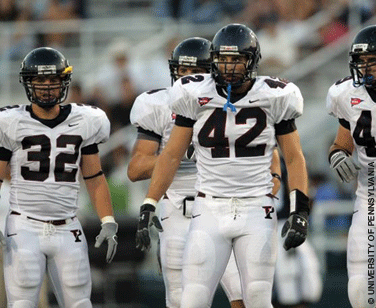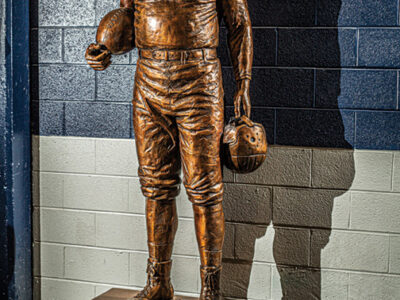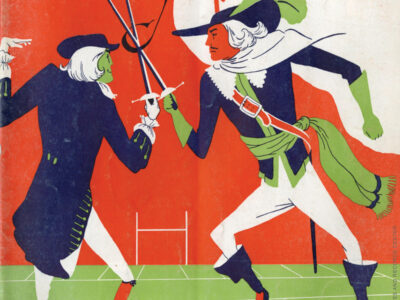
By David Porter
What is a coach to do when his once-dominant team has gradually fallen back to the pack, consigned to watching others lift the trophies and win the accolades that once seemed, if not guaranteed, then as reliable as the cold winds whipping through Franklin Field on November Saturdays?
If you are Al Bagnoli, you start by looking in the mirror and not at the 108 victories (second all-time at Penn) or the 42-7 record from 2000 to 2004 or the six Ivy League championships. Resting on one’s laurels and polishing up the trophies isn’t going to erase the effects of three consecutive mediocre seasons—even if the previous 13 had set near-impossible standards to match.
“It’s something I gave a lot of thought to last fall,” Bagnoli said recently as he reflected on the current state of Penn’s football program. “At the end of the year we had a whole different blueprint to how we approached this season. My mindset had to change as well. Things we were doing might have made sense five years ago, but they needed to change.”
The soup-to-nuts overhaul included bringing in motivational speakers, employing a nutritionist, adding specialized coaches who brought programs tailored to improving speed and agility, retooling the team’s weight-lifting routines and doing things as seemingly rudimentary as getting players back on campus earlier to conduct unofficial workouts.
Whether any of it has made an appreciable difference will be evident soon enough, as the Quakers open on September 20 with local nemesis Villanova—a team Bagnoli has never defeated, despite some agonizing near misses.
Some will be able to recite the Quakers’ litany of troubles over the last few years from memory; for everyone else, it is useful to revisit them if only to highlight the capricious nature of football and the exceedingly fine line between winning and losing.
The most crippling blow to the football program occurred off the field in 2005, when senior defensive back Kyle Ambrogi W’06 took his own life. A wounded Penn team dealt with the grief as well as it could, but hearts and minds were elsewhere, understandably, and the team closed out the season with four losses in five games.
The 2006 season featured a 4-1 start, followed by the bizarre spectacle of three consecutive overtime losses as the Quakers found themselves sabotaged by a shaky kicking game. Finally, last fall Penn lost then-junior quarterback Robert Irvin to injury in the season’s first game, then had to make do with star tailback Joe Sandberg C’07 dogged by injuries for the entire season.
The good news: Irvin’s shoulder injury has healed and, according to Bagnoli, the 6-foot-5, 220-pounder from Davidson, N.C., is throwing the ball as well as he did in 2006 when he threw for 2,128 yards and 10 touchdowns. And though Sandberg has graduated along with leading receiver Braden Lepisto W’08, leading tackler Joe Anastasio W’08, and All-Ivy first-teamers center Brian Brazinski W’08 and defensive lineman Naheem Harris C’08, there are enough quality players returning—or waiting their turn—for Bagnoli to express a measured optimism for 2008.
He is especially excited about the tandem of sophomore running backs Michael DiMaggio and Bradford Blackmon, who spelled Sandberg capably last season and helped Penn rush for more than 1,600 yards (or about 600 yards more than their opponents).
Another area of strength figures to be the defensive backfield, a vital component of any defense in an age when more and more teams favor spread formations with multiple receivers. The unit is led by senior Tyson Maugle (Penn’s second-leading tackler in 2007) and junior Chris Wynn, who was named to the All-Ivy first team after intercepting five passes as a sophomore. Wynn averaged a respectable 23 yards on kickoff returns; even better for the Quakers, he’ll be complemented by junior Tyler Fisher, who led the league last season with a 27.7-yard average.
Lepisto was a versatile performer for Penn—he took over the kicking duties in 2006 in addition to playing wide receiver—but Bagnoli is enthused about the pass-catching abilities and overall potential of Fisher and junior Marcus Lawrence (second-leading 21 catches for 207 yards in 2007). Starting tight end Josh Koontz returns for his senior year to give Irvin another target.
There shouldn’t be any anxiety surrounding the kicking game if Andrew Samson stays healthy. As a freshman last year, Samson was perfect (29-for-29) on extra points and made 7 of 15 field goal attempts and helped the Quakers forget about the travails of 2006.
The key to this season, of course, will be whether Irvin can stay healthy and return to the form he displayed in 2006. Recognizing that Irvin may have tried to come back too early last fall after offseason shoulder surgery, Bagnoli prohibited him from throwing during practice until the summer, and early returns have been encouraging.
It would be almost impossible to overstate how directly the fortunes of a football team are tied to the performance of its quarterback; there may be no other position in sport that has such a direct bearing on winning and losing, other than perhaps a starting pitcher in baseball. Penn found out the hard way last season when Irvin went down and, despite a valiant effort by replacement Bryan Walker W’08, the Quakers wound up near the bottom of the league in passing and scoring offense, despite having the league’s third-best rushing attack.
“I don’t care what program you’re talking about, if you’re not going to play with your starting quarterback for the season and your all-league tailback is playing less than 50 percent of the time, you’re going to stumble,” Bagnoli said. “It’s one thing to have depth, and it’s another to try to replace your marquee guys. That’s why we were so woefully inconsistent last season.”
It is tempting to speculate that Penn’s recent struggles can be chalked up to some kind of karmic reversal after all their successes of the late ’90s and early ’00s. Bagnoli is keenly attuned to the quirks of the game, but also knows there is more to it than that.
“For a long time we got a lot of breaks; the last few years we didn’t get many,” he said. “Maybe we’re due. Sooner or later, you hope those even themselves out. But the reality is we’re not at the level we expect to be and think we should be, and it’s up to us to shake things up and have some renewed vigor and optimism.”
David Porter C’82 writes for the Associated Press.




